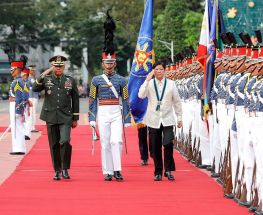Farmers seek release of P11.8-B JBIC loan for San Roque dam
September 28, 2002 | 12:00am
A local farmers’ group is pressing the Japan Bank for International Cooperation (JBIC) to continue its financial support for the P11.766-billion San Roque Multi-Purpose Project (SRMP) in Pangasinan.
The appeal was made by the 60,000-strong Agno River Federation of Irrigators Association (ARFIA), an organization representing the interests of farmers in the lower Agno River Basin. ARFIA said the project’s irrigation component will greatly enhance the livelihood of the more than two million farmer families within the area.
The group of Pangasinan farmers and irrigators met with Japanese officials from the Ministry of Finance for a dialogue at the Japanese embassy yesterday.
Helen Q. Valenzuela, ARFIA president, said that with the havoc wrought by the series of typhoons that hit the country, farmers belonging to their federation suffered production losses totaling P292 million.
The investment component of the National Irrigation Administration (NIA) on the project is just P974,079 but the Agno River Integrated Irrigation Project totaling P10.792 billion needs to be integrated with the SMRP.
JBIC however, has held back the release of the loan pending settlement of all relocation problems involving the affected communities.
Valenzuela blamed groups opposing the project such as the Cordillera People’s Alliance (CPA) which she said will not even be affected directly by the project.
Valenzuela said the ARFIA wants the project to push through to mitigate the perennial flooding that plagues Pangasinan, reduce property damage, destruction of crops and loss of life. On the other hand, the irrigation component promises to provide sufficient water supply for the drought-prone farmlands year-round.
The dialogue with Japanese officials is not the first action that the farmers’ group have launched to support their plea for the continued funding of the SRMP. Last week, the ARFIA and other famers’ and fisheries’ organizations in Pangasinan sent letters to the Japanese government strongly supporting the project and the completion of its irrigation component.
The ARFIA, it its letter to the Japanese Minister of Finance, denied any participation in the calls to stop the San Roque project and condemned anti-dam advocates and extremist NGOs for making statements and demands and claiming to be representatives of Pangasinan farmers.
The financial support for the SRMP project comes from loans provided by Japanese institutions. Recently, anti-SRMP advocates led in the Philippines by the CPA called for the cancellation of the project’s remaining loan and the termination of water impoundment in the San Roque reservoir.
The CPA, its umbrella organizations and the foreign NGOs that fund them, have, since the start of the SRMP, opposed the dam construction citing alleged environment and social problems that the project would bring.
These groups’ demands have been able to mobilize political pressure in Japan that has forced Japanese creditors to postpone the release of the funding for SRMP irrigation component, supposedly until all complaints are ironed out.
The appeal was made by the 60,000-strong Agno River Federation of Irrigators Association (ARFIA), an organization representing the interests of farmers in the lower Agno River Basin. ARFIA said the project’s irrigation component will greatly enhance the livelihood of the more than two million farmer families within the area.
The group of Pangasinan farmers and irrigators met with Japanese officials from the Ministry of Finance for a dialogue at the Japanese embassy yesterday.
Helen Q. Valenzuela, ARFIA president, said that with the havoc wrought by the series of typhoons that hit the country, farmers belonging to their federation suffered production losses totaling P292 million.
The investment component of the National Irrigation Administration (NIA) on the project is just P974,079 but the Agno River Integrated Irrigation Project totaling P10.792 billion needs to be integrated with the SMRP.
JBIC however, has held back the release of the loan pending settlement of all relocation problems involving the affected communities.
Valenzuela blamed groups opposing the project such as the Cordillera People’s Alliance (CPA) which she said will not even be affected directly by the project.
Valenzuela said the ARFIA wants the project to push through to mitigate the perennial flooding that plagues Pangasinan, reduce property damage, destruction of crops and loss of life. On the other hand, the irrigation component promises to provide sufficient water supply for the drought-prone farmlands year-round.
The dialogue with Japanese officials is not the first action that the farmers’ group have launched to support their plea for the continued funding of the SRMP. Last week, the ARFIA and other famers’ and fisheries’ organizations in Pangasinan sent letters to the Japanese government strongly supporting the project and the completion of its irrigation component.
The ARFIA, it its letter to the Japanese Minister of Finance, denied any participation in the calls to stop the San Roque project and condemned anti-dam advocates and extremist NGOs for making statements and demands and claiming to be representatives of Pangasinan farmers.
The financial support for the SRMP project comes from loans provided by Japanese institutions. Recently, anti-SRMP advocates led in the Philippines by the CPA called for the cancellation of the project’s remaining loan and the termination of water impoundment in the San Roque reservoir.
The CPA, its umbrella organizations and the foreign NGOs that fund them, have, since the start of the SRMP, opposed the dam construction citing alleged environment and social problems that the project would bring.
These groups’ demands have been able to mobilize political pressure in Japan that has forced Japanese creditors to postpone the release of the funding for SRMP irrigation component, supposedly until all complaints are ironed out.
BrandSpace Articles
<
>
- Latest
- Trending
Trending
Latest


























